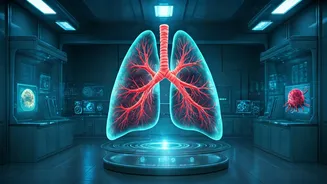Whales' Cancer Puzzle
The remarkable size and longevity of whales present a paradox concerning cancer. Larger animals with longer lifespans should theoretically have a higher
risk of developing cancer due to increased cell divisions and exposure to environmental factors. Yet, whales, particularly those with the longest lifespans, do not exhibit cancer rates that align with this expectation. This discrepancy, known as Peto's Paradox, has sparked significant scientific interest. Researchers are working to decipher why these massive creatures appear to be somewhat shielded from the disease. Understanding the mechanisms that protect whales from cancer could yield significant breakthroughs for human health. Several research groups are focusing on the genetic and cellular differences that might contribute to whales' apparent resistance.
Genetics and Protection
One key area of research involves examining the genetics of whales. Scientists are investigating whether whales possess specific genes that enhance their ability to repair DNA damage or suppress tumor growth. For instance, the presence of multiple copies of tumor suppressor genes, which are responsible for regulating cell division and preventing uncontrolled growth, has been observed in some whale species. These extra gene copies could act as a robust defense mechanism, compensating for genetic mutations that might otherwise lead to cancer. Moreover, scientists are exploring the role of unique cellular processes, like the efficiency of programmed cell death (apoptosis), which is crucial for eliminating damaged or cancerous cells. Whales may have evolved more effective ways to initiate apoptosis, thereby preventing tumors from developing or spreading.
Cellular Mechanisms Unveiled
Beyond genetics, scientists are investigating cellular mechanisms in whales that could contribute to cancer resistance. This includes exploring how whales respond to environmental carcinogens and the efficiency of their immune systems. Whale cells may possess more effective ways of detoxifying harmful substances, such as pollutants in the ocean, thus minimizing the risk of DNA damage. Furthermore, the whale immune system may have evolved to recognize and eliminate cancerous cells more effectively than in humans. Studying whale immune responses could provide valuable insights for developing new cancer immunotherapies. In addition, researchers are examining how whale cells interact with their surroundings, including cell-to-cell communication and the role of the extracellular matrix. These factors play an important role in tumor growth and metastasis. Understanding these complex cellular interactions could provide new targets for cancer treatment.
Comparative Oncology's Impact
The field of comparative oncology, which compares cancer biology across different species, is central to this research. Scientists are comparing the genomes, cells, and tissues of whales with those of other mammals, including humans, to identify the differences that could explain cancer resistance. This involves analyzing massive datasets and employing advanced techniques, such as next-generation sequencing, to map and analyze whale genomes. The goal is to identify unique genes and pathways that might protect whales from cancer. Comparative studies also involve looking at the environment whales live in, including exposure to pollutants, and how this impacts their health and susceptibility to cancer. Research in this area requires collaboration among marine biologists, geneticists, oncologists, and other specialists, bringing together knowledge from multiple disciplines to achieve a more complete understanding of whale biology.
Future Research Pathways
The study of whales and cancer is an ongoing journey with many opportunities for future research. Scientists are planning to further explore the genetic and cellular differences between whale species, seeking to determine which ones are most resistant to cancer. There is a need for more detailed studies of whale immune systems and their effectiveness against cancer. Additionally, researchers are developing new models, such as whale cell cultures and tissue samples, to study cancer in a controlled environment. The future of this research also involves applying what is learned from whales to human medicine. The ultimate goal is to translate scientific discoveries into new ways to prevent, diagnose, and treat cancer in humans. This includes potential drug targets and developing new therapies, such as immunotherapies and gene therapies. The study of whales and cancer promises to transform the understanding of this disease.






















